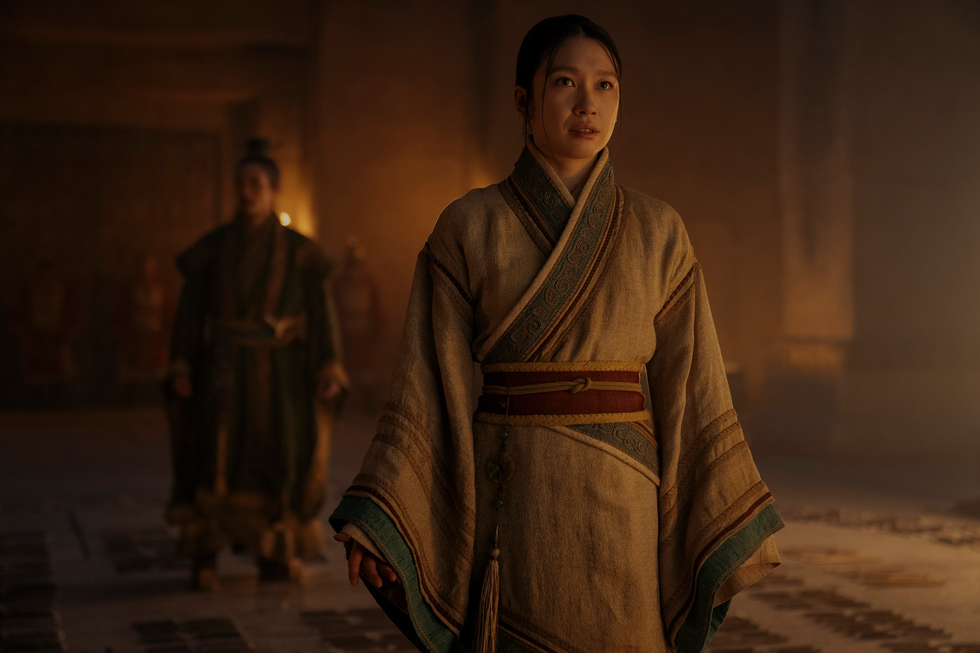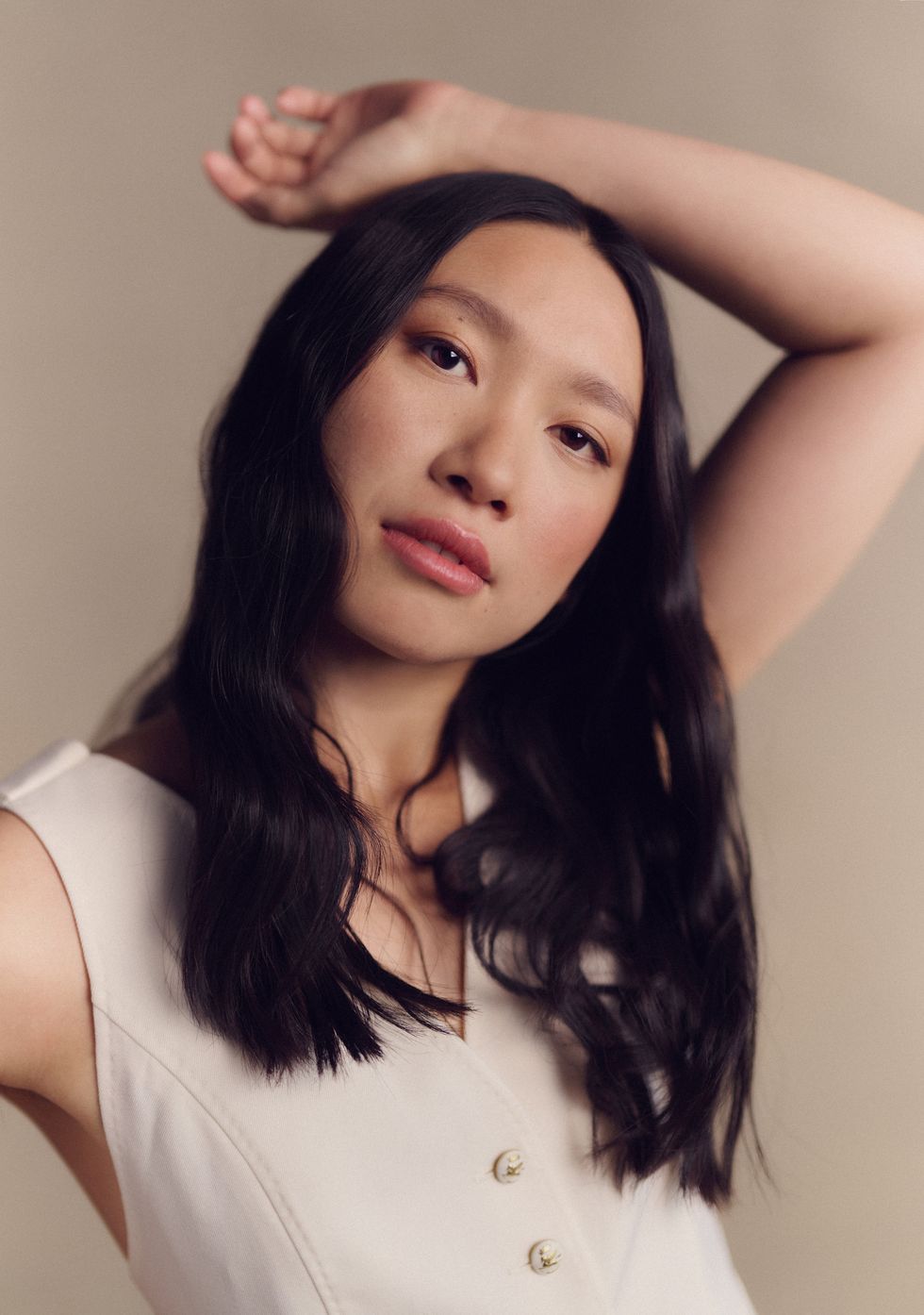Jess Hong Can’t Solve the 3 Body Problem. She’ll Try to Save the World Anyway.
Jess Hong remembers a sweaty morning in Auckland on the day she was chosen—though it’s possible, of course, that was owing to her nerves. She’d miraculously charted through each of the checkpoints into the world of “Untitled Benioff Project,” an as-yet-unannounced Netflix TV series developed by Game of Thrones’ David Benioff and D.B. Weiss, as well as former True Blood writer and The Terror co-creator Alexander Woo. “It didn’t really click that it was David Benioff until we had [a] Zoom meeting,” Hong tells me. “I was like, ‘Oh, I’m meeting them. But it’s them. What the fuck.’”
At the time, it was the latter half of 2021, and New Zealand was still enacting COVID control measures that included lockdowns. Hong had managed to book a theater gig touring at primary schools throughout the country, but she’d sent off her “Untitled Benioff” audition tapes as a bit of wishful thinking. She’d be too far from the action under the most benign circumstances, let alone in a pandemic. (“Kiwis, often we audition for things overseas, but we never expect anything,” she says.) When her agent called her that fateful day a few weeks later, Hong was back at home in Auckland; her roommate was in the kitchen “baking bread or something”; and Hong had nowhere to direct her energy when her agent delivered the news: The actress would play genius physicist Jin Cheng in Netflix’s 3 Body Problem. In her first-ever TV role, she’d be No. 1 on the call sheet. Hong shrieked loud enough to “burst her [agent’s] eardrum,” then went to work wearing a path through the floorboards as she sprinted laps around her house. “There was too much energy,” she says. “I couldn’t contain it.”
3 Body Problem, the first season of which dropped on Netflix on March 21, is Benioff and Weiss’ first major project since Game of Thrones, and a similarly tricky work of translation from book to screen. The series is based on the acclaimed Chinese novel The Three-Body Problem by Cixin Liu, part of the larger Remembrance of Earth’s Past trilogy, in which humanity must prepare for the invasion of an alien species from a three-sun solar system. The extraordinary success of Thrones (no matter its ridiculed ending) gave its co-creators the leverage to tackle another series largely deemed unadaptable—and to cast an actress like Hong in a leading role.
“Because of the success that they’ve had, they are the big names,” Hong says. “They don’t need to do the whole star system thing to get people interested in the show, because people are interested in them. Which means they can cast someone from New Zealand who’s mostly done theater work, [send her to] London, and be part of the huge thing.”
Hong downloaded the Earth’s Past trilogy on her Kindle shortly after she was cast. (She’ll admit to skimming some sections: They’re “pretty dense, I’m not going to lie.”) The character of Jin Cheng first appears in the third book, so Hong had an existing character portrait to work with, even if Benioff, Weiss, and Woo had taken significant liberties with where and how Jin would show up in the adaptation. In Netflix’s take, Jin is a physicist—or, “a senior researcher in the Theoretical Physics group at Imperial College, doing a metastudy analyzing the results of particle accelerator experiments around the world,” as she tells one would-be suitor in the first episode—born in Hubei, China, where her parents died in a flood. She spent the rest of her childhood and adolescence in New Zealand before moving to London, eventually embedding herself with the so-called “Oxford Five,” a group of brilliant young scientists whose careers have since veered into sectors as divergent as public-school teaching, nanofiber development, and snack manufacturing. When one of their former mentors dies by apparent suicide, the Oxford Five reunite as particle accelerator experiments around the world go haywire. As one Five member puts it early on, “Science is broken.” Spoiler alert: Those aforementioned aliens, known as the San-Ti, might have something to do with it.
As Jin is pulled into a much larger and more significant plot to either a) pave the way for the San-Ti or b) curtail their threat to humanity, her instinct at every interval is to absorb as much information as she can. She can’t, after all, fight an enemy she doesn’t recognize. In episode 3, one Five member named Will (Alex Sharp)—who’s long nursed a powerful crush on Jin—tells her, “Maybe there’s more to life than knowing everything.” To which Jin responds with raised eyebrows and a self-serious smirk: “Unlikely.”
“I believe the reason that she fights so hard and never gives up when solving problems is that she believes the world can be a better place on the other side,” Hong says. “‘If we just solve all the riddles of the universe, then the world will be better for everyone in it,’ including her friends and herself. The way to save the world is just to know everything. That’s her method, but her intention is about people at the end of the day.”
It’s an inclination Hong can relate with, even if her methods are more interior—and markedly less scientific. (She’s not a physicist, and no, she doesn’t understand the real three-body problem from which the series gets its name.) But she got into acting with the express purpose of understanding herself. In the “small-ish,” “quite conservative” town of Palmerston North (population under 100,000), she “grew up incredibly shy and socially anxious, which a lot of people wouldn’t believe now,” she says. Raised by her mom, a single immigrant parent—Hong’s mother is from Guangzhou, China; her father is from Shanghai—Hong often felt isolated in her majority-white community. She enrolled in drama classes “because it was the scariest thing I could think of doing when I was 13.”
At first, her thrill wasn’t in the performing itself, but in her heightened self-awareness. “As soon as we were allowed to write our own monologues, I got really into it because I could pour myself into my characters,” Hong says. “I thought that acting was therapy, because suddenly I was experiencing catharsis on a level that I’d never felt. It was very, very self-indulgent at the beginning for me. And so I got addicted to it that way.” Only then did she improve her actual acting skills, and begin to take pleasure in projecting her character’s emotional highs and lows onto an audience. “I actually got into it pretty late as a way to boost my confidence, and it worked way too well,” she says, laughing. “Now, I’m way too loud.”
She went on to study at Toi Whakaari, New Zealand’s national drama school in the capital city of Wellington. “Three years of the best and worst years of my life,” Hong says, “as anyone who’s been to drama school will tell you.” In her last year of school, she secured an agent, and after graduation in 2019, she moved to Auckland to wait tables and blend coffees as she tossed audition tapes into the ether. For a time, she lived with somewhere around 20 artists in a commune, during which the residents would throw a weekly watch party for Game of Thrones’ final season. Hong never made it to one of these events—she was always too busy juggling part-time jobs—but doesn’t fail to note the irony.
The youngest of three sisters, Hong had always felt her siblings’ implicit support of her career path, if not their understanding. While dropping her off at drama school, one of them noted their pride at her commitment to acting. “I bawled my eyes out because I’d never heard her say that before,” Hong says. “That was the first time, and I’m emotional just thinking about it. I was like, ‘What the hell? After all the shit that I’d done? After everything I put them through?’ I was a bratty kid!”
When 3 Body Problem finally came around, neither sister could truly comprehend the significance of the role Hong had secured. When they found out she’d be moving to London for the shoot, they recommended a website where Hong could hunt down inexpensive accommodations. She told them there was no need; Netflix would be footing the bill for her stay. “[My sisters] went, ‘What?’” Hong says. “‘Wait, how big is this thing?’”
As it turned out, huge. Some of Hong’s earliest days on set were spent filming the show’s massive VR sequences, which take place inside a video-game world where the humanoid characters seek survival against their three-sun solar system’s erratic planetary climate. Working with Thrones alum John Bradley in a number of these complex scenes, Hong slowly learned to combat her own homesickness with the help of her Oxford Five co-stars. “Every now and then I’d turn to John and just be like, ‘Wow, our job’s really fucking weird,’” she says.
The main cast launched a group chat named “Physics Five + Raj,” allowing actor Saamer Usmani—who plays Jin’s military boyfriend, Raj—into the club. (The actors have gotten the names “Oxford Five” versus “Physics Five” confused on more than one occasion, but the name persists.) As a group, they’ve become something of a found family. “Obviously David and Dan have a history of getting together huge ensembles that don’t want to kill each other in real life,” Hong says. “They have an instinct about people, I think.”
3 Body Problem—for all its lofty hard science and sweeping themes about significance and extinction and what we owe the future—is ultimately a more intimate saga, content foregoing epic interstellar showdowns in favor of one-on-one conversations and slower-moving twists… at least for the time being. It’s a television model that feels older, more exploratory, if imperfectly executed. Hong understands the risk, and hopes the show will nevertheless draw a strong audience in the era of the “gourmet cheeseburger” Hollywood model, as coined by one of Netflix’s own vice presidents. “I just hope that, in this world of hype culture, something like this … a character-driven story, is still enough to hold audiences across the globe,” Hong says. “Because it’s such good writing, and [the creators] have done an incredible job to bring it all together into a really, really complex cross-section of humanity in its response to existential stuff.”
With that desire comes a plea for continuing the show through its natural conclusion. “I really hope that we get a season 2,” Hong says, “because Jin Cheng is one of the coolest, juiciest characters I’ve ever played. But also I’ve read the books, so I know what’s coming. It would be awesome to have to justify those decisions and enter those worlds.”
As we near the end of our allotted interview time, Hong blinks into the Zoom screen and leans back in her chair. She’s dressed in press-tour glam—an ivory halter-neck dress, bright red lipstick—but her eyes have filled with tears as she considers what the full arc of this extraordinary Hollywood debut has taught her. “It’s interesting that I’m getting emotional about this,” she observes, struggling to keep her voice steady. Jin Cheng, she argues, is an idealist, no matter the assumed skepticism of her craft. Hong, too, is an idealist, and considers her optimism hard-won in the years since her “jaded” youth. Tasked with tackling the scientific problems imparted by a new threat to humanity, Jin might be one of the most important people on Earth in 3 Body Problem’s fictional reality. Hong, by contrast, was plucked from what she might call obscurity. But they are similarly interested in the fundamental value of a single human life, and in the belief that those individual lives must align into a path for the whole’s survival.
“I never want to give up on giving every single person the benefit of the doubt in this world that is so suspicious and divided,” Hong says. “And I don’t want other people to give up, either.”





